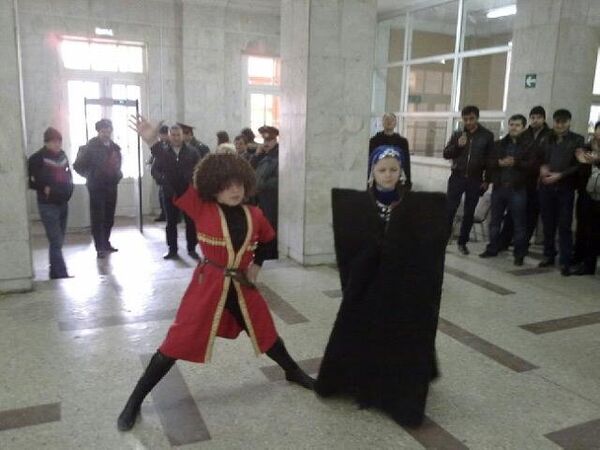Chess tournaments, traditional Caucasian dancing, half-naked voters and five heart attacks were among the memorable highlights of Russia’s presidential polling day on March 4.
Fearless Swimmers
“We asked them to leave [the polling station] and go ice swimming,” an election commission chairman in the Siberian city of Barnaul said, after a group of men arrived at his polling station clad only in swimwear.
The scantily clad voters were ice swimming enthusiasts, who cast their ballots as the mercury in Barnaul fell to minus 2 degrees Celsius.
“We've voted like this four times already and plan to unite all Siberian ice swimmers for the next elections and vote simultaneously in our cities,” said Alexander Zelenetsky, leader of the Polar Bears ice swimming association.
A more dramatic semi-nude scene took place just minutes after Prime Minister Vladimir Putin and his wife Lyudmila cast their ballots at a polling station at the Russian Academy of Sciences in south-west Moscow. As Putin left the building, three topless women with the words “I steal for Putin” painted on their breasts burst into the polling station shouting anti-government slogans and were immediately detained by police.
The women told reporters they were activists from the Ukrainian Femen group, which has a history of staging dramatic topless protests.
Hundred of miles to the east, in Yoshkar-Ola, the capital of the Volga republic of Mari El, voters were given coupons for a free haircut or manicure. There were also chess and other sports competitions organized at polling stations across the city, and voters were invited to attend free concerts, excursions and exhibitions.
In Russia’s North Caucasus republic of Ingushetia, a 116-year-old man came to a polling station in the remote mountainous village of Guli to cast his ballot. The man, Appas Iliyev, was born in 1896, a couple of years after Tsar Nicholas II ascended the throne.
Russian retirees are usually among the first to arrive at the polling stations when they open at 8.00 a.m. For a handful of them, their enthusiasm had tragic consequences.
A 72-year female voter was just five meters away from the entrance to her polling station in the city of Volgograd when she suffered a heart attack. The woman died before doctors arrived at the scene, police said. Four similar cases occurred on Sunday across Russia.
Lezginka dancing
A video of a man dancing the Lezginka, a traditional Caucasian mountaineer dance, at a polling station, was published on the internet on Sunday. Bloggers speculated that the dancer was Ramzan Kadyrov, the leader of the North Caucasus republic of Chechnya, but Kadyrov’s press secretary Alvi Kerimov was quick to deny it.
“Even if it was Kadyrov, the video was not shot today,” he said. “Today, Kadyrov did not dance. He came to the polling station with his mother, cast his ballot and left.”
The Chechen leader, who fought against federal troops during the first Chechen war in the mid-1990s but has since loyally sided with the Kremlin, has performed the Lezginka at public events in the past, including during a friendly soccer match between Chechnya and Brazil last March.
Chechnya traditionally ranks among Russia’s regions with the highest voter turnover which according to official statistics sometimes exceeds 99 percent of the vote, as in last year’s parliamentary polls. Sunday’s vote was not an exception: as of 6 p.m. local time, three hours before polling stations closed, turnout in Kadyrov’s republic was the highest in Russia, reaching almost 95 percent, official figures show.
Cossacks guard polling stations
In the Tula region, some 120 miles to the south of Moscow, Cossacks, traditionally fervent patriots and guardians of the state, were deployed at polling stations for the first time in history.
Overall, some 440,000 security guards, including 380,000 police, 30,000 employees of private security firms and 30,000 voluntary security squads, were deployed across Russia to ensure order during the vote. In Moscow, more than 30,000 police officers were on the streets. Dozens of buses carrying riot police were parked around downtown Moscow on standby, with thousands of pro-Putin activists taking to the streets shortly after the vote.
Some Russians, mostly employees of state enterprises, have complained of administrative pressure to go to polls.
“Several days before the election, my boss asked all the workers to call him once we have cast our ballots on March 4,” said a Moscow doctor who gave her name as Irina. “I did not even get it at first,” she admitted.
She said that her eight-year-old daughter recently brought a leaflet home from school in which the deputy headmaster called on parents to choose “stability and prosperity” and vote for Putin.
Meanwhile, in southern Moscow, a brass band in bright red suits welcomed voters with patriotic songs. Kiosks selling fruits and vegetables were deployed around the building to draw in voters.
Inside, however, the hype was lost on some voters.
“There is no candidate that I would like to support,” a voter who identified herself as Elena, 26, admitted. “But I had to choose someone, that’s why I cast my ballot for Putin,” she said.
According to preliminary results announced by Central Elections Commission head Vladimir Churov after some 26 percent of the ballots have been counted, Putin has gained about 63.2 percent of the vote. His closest competitor, Communist leader Gennady Zyuganov, took some 17.3 percent.


